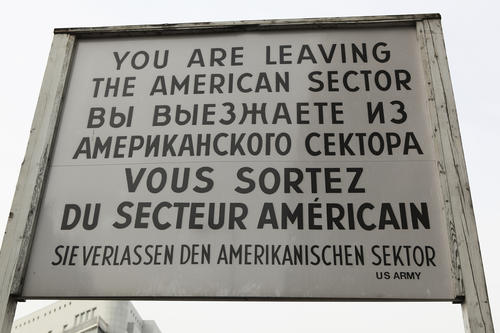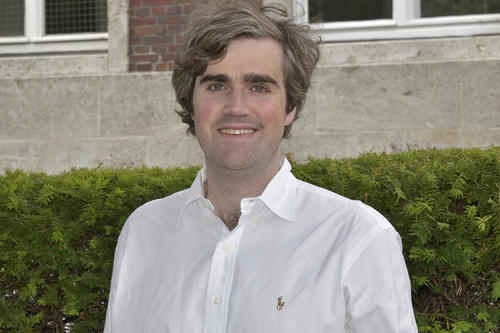A War with More than Two Parties
American historian Timothy Nunan is currently at Freie Universität studying the importance of the Middle East during the Cold War.
Feb 22, 2017
“The Cold War wasn’t just a struggle between East and West,” says historian Timothy Nunan.
Image Credit: Bernd Neeser / iStock
Timothy Nunan is currently at Freie Universität studying the role of the Middle East in the Cold War.
Image Credit: Manuel Krane
The Cold War is often described as a conflict between East and West. Previously, little attention had been paid to the role of the Middle East as another theater in this geopolitical conflict. Timothy Nunan, who studied at Princeton University and earned his doctorate at Oxford, wants to change that.
He is studying the role of the Middle East in the Cold War. The title of Nunan’s research project is “The Cold War’s Clash of Civilizations: The Soviet Union, the Left, and the International Origins of Islamism.” The project is based at the Friedrich Meinecke Institute of History at Freie Universität and is receiving funding from the Volkswagen Foundation through its “Freigeist” fellowship program.
“At the time of the Cold War, many countries in the Middle East received support from one or the other of the two bloc powers that were in conflict,” Nunan explains. But the conflict between the USSR and Warsaw Pact countries on the one side and the NATO countries on the other was never central in these countries, he says. “In these countries, the difference between capitalism and communism was perceived as a choice between two Western development models,” Nunan says, “but many clerics and intellectuals in the Middle East were focused on building Islamic societies.”
Attempts by both East and West to forge alliances in the Islamic world, thereby developing a kind of “safety belt,” succeeded at first, Nunan explains. For example, countries in the Middle East were happy to accept development aid from the bloc powers. However, the economic development that Middle Eastern countries hoped would proceed from the aid provided by the bloc powers failed to materialize. Widespread disappointment took hold there in the 1970s as a result.
“People in Islamic countries wanted to get back to their roots, to an authentic lifestyle,” Nunan says. They wanted existing systems to give way to states with a more Islamic bent. One initial success in this regard was the Iranian Revolution, which saw a victory for Shiites led by Ayatollah Khomeini in 1979. The fact that Iran was governed by Shiites from then on was viewed as a threat by those in power in countries with large Sunni populations, he explains.
War within the Islamic World
Nunan’s research focuses on the question of how the struggle against socialism was able to develop into a war within the Islamic world. “From the 1980s on, the Shiites were a bigger threat to the Sunnis than the United States or the Soviet Union,” he says. The United States supported the Sunni mujahideen in Pakistan and Afghanistan, Nunan says, but without distinguishing between the different denominations of Islam.
“Neither Washington nor Moscow understood that the conflict in Afghanistan and elsewhere had been superimposed over a sectarian struggle,” the historian explains. While countries like Iraq, Saudi Arabia, and Kuwait tried to curb the spread of revolutionary Iranian influence to the west through the Iran-Iraq War, they also supported anti-Shia Islamic militias in Afghanistan in an effort to create a kind of buffer zone surrounding Iran.
Starting in the 1980s at the latest, Nunan points out, the Cold War was no longer exclusively a conflict between East and West. “We tend to perceive ourselves as the main subject of our opponent’s foreign policy – even though that might not necessarily have actually been the case,” Nunan says with an eye to his own home country.
He believes the rise and spread of the organization known as the Islamic State can also be viewed as a long-term effect of the Cold War. Shiite Islam has become more widespread in the Middle East since the Islamic Revolution. When Saddam Hussein, the secular dictator of Iraq, was toppled in 2003 – taking the ruling Ba’ath Party with him – Shiites were able to establish a power base in Iraq. Nunan explains that the Sunnis saw this as a threat, which is why the predominantly Sunni Islamic State was founded. “The conflict is mainly between Sunnis and Shiites, and much less against the Western world,” Nunan says.
Research in Russia and Afghanistan
In addition to his own native language, Nunan also speaks Russian and Farsi (Persian), and he plans to learn Arabic in the next few years. “The most important texts for my research project are written in Russian and Farsi,” he explains, so it is important to be proficient in the languages of multiple parties to the conflict in order to understand his subject. Nunan plans to complete the project by 2021, when he will also have a book manuscript ready for publication. Trips to Russia and Afghanistan for research purposes are scheduled for the next few years.
Nunan points out that Berlin, the very heart of the Cold War, is an excellent place to work on the topic, and not just in geographic terms. He deliberately chose the Friedrich Meinecke Institute (FMI) at Freie Universität as the research site for his project. Nunan especially values the broad range of academic topics covered at the institute. “I hope to work with scholars there with whom I can discuss international interrelations, the role of religions, and many other things that touch upon my research project,” he says.
The “Freigeist” fellowship is awarded by the Volkswagen Foundation for five years. The foundation’s goal in this program is to support postdoctoral researchers who are, in its own words, “free spirit[s], enjoying the unexpected, even unexpected difficulties.”
Further Information
Timothy Nunan, Freie Universität Berlin, Friedrich Meinecke Institute, Koserstraße 20, 14195 Berlin, Email: Timothy.Nunan@fu-berlin.de


